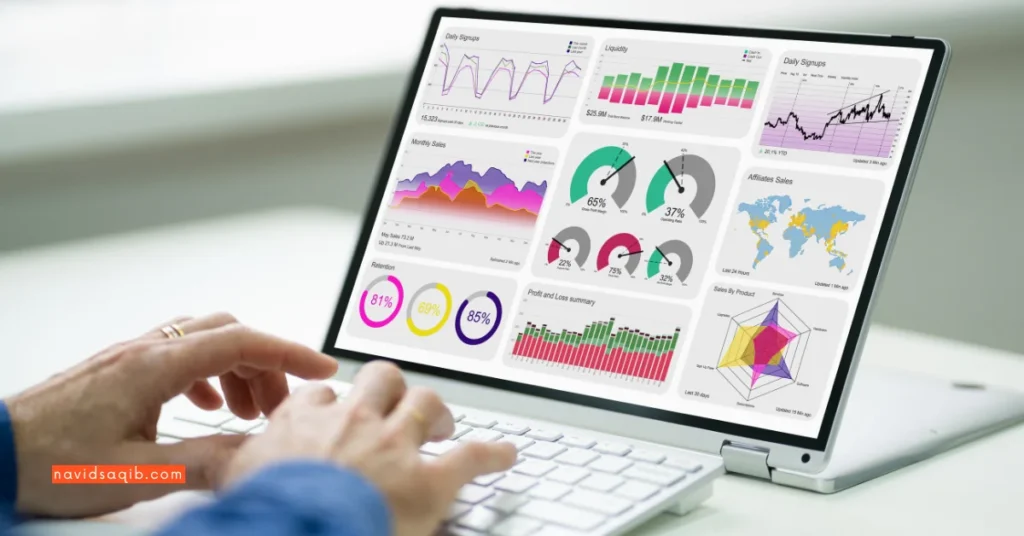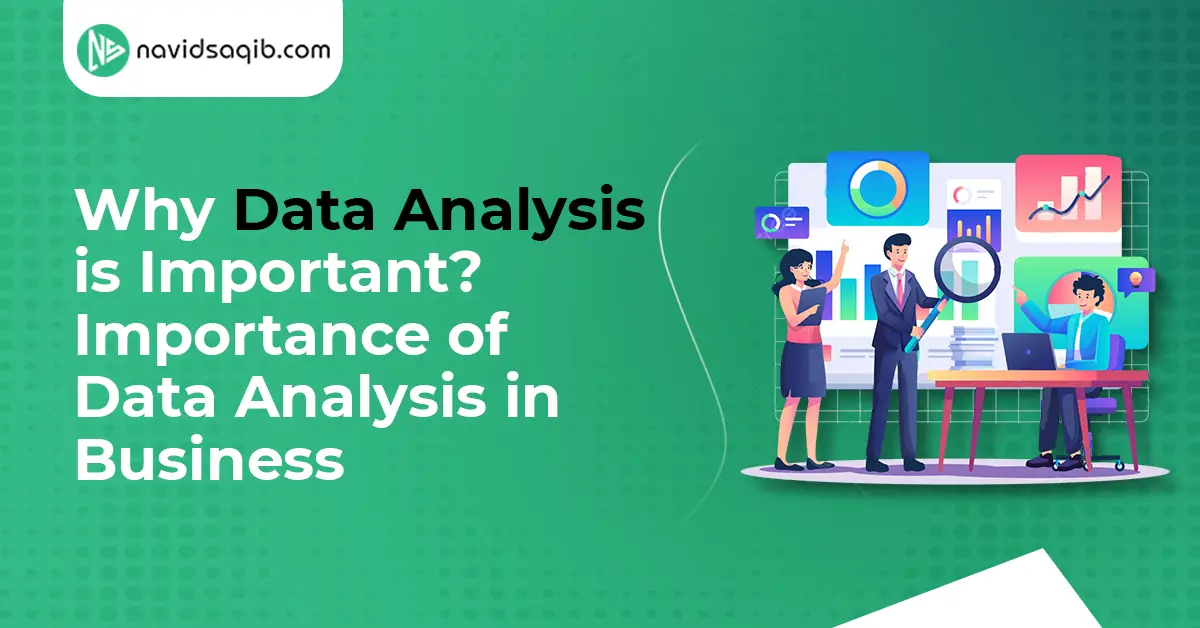In the contemporary business landscape, the role of data is more prominent than ever before. From marketing strategies to product development, decision-making processes in business now heavily rely on data.
Data analysis, in particular, has emerged as one of the most crucial tools for businesses looking to enhance their operations, improve customer satisfaction, and drive profitability.
This article explores why data analysis is important, its impact on businesses, and how it is reshaping industries.
Let’s get started……

Stay Ahead in Your Studies!
Don’t miss out on valuable resources that can help you excel in your academic journey!
What is Data Analysis?
Data analysis refers to the process of inspecting, cleaning, transforming, and modelling data to discover useful information, draw conclusions, and support decision-making.

By analyzing data, businesses can extract actionable insights that can lead to improvements across various aspects of their operations.
The importance of data analysis lies in its ability to turn raw data into meaningful and actionable insights.
In today’s data-driven world, businesses have access to vast amounts of data from multiple sources, such as customer interactions, social media activity, sales transactions, website traffic, and more.
However, the true value of this data is unlocked only through effective analysis.
Data analysis typically follows several stages:
- Data Collection: Gathering raw data from various sources, such as surveys, sensors, databases, or online platforms.
- Data Cleaning: Identifying and correcting errors, inconsistencies, or missing values in the data to ensure accuracy.
- Data Transformation: Converting data into a usable format, often by aggregating or normalizing it.
- Exploratory Data Analysis (EDA): Analyzing data through visualization and summary statistics to understand its structure, patterns, and relationships.
- Modelling and Analysis: Applying statistical models or machine learning algorithms to identify trends, make predictions, or find patterns.
- Interpretation: Drawing meaningful insights from the results to answer research questions or solve business problems.
Overall, data analysis is essential in many fields such as business, healthcare, social sciences, and technology for making informed decisions based on data-driven evidence.
Making Informed Decisions
One of the most significant advantages of data analysis is its ability to empower businesses to make informed decisions. In the past, business decisions were often based on intuition or limited anecdotal evidence.
Today, data analysis allows business leaders to base decisions on concrete evidence, reducing the risks associated with guesswork.
For example, a company launching a new product can use data analysis to understand market demand, customer preferences, and potential competition.
Rather than relying on assumptions, the company can leverage data to refine its product design, marketing strategy, and distribution methods, increasing the chances of success.
Moreover, data analysis provides businesses with real-time insights, allowing them to adjust strategies and operations promptly. For example, an e-commerce business can use data analysis to track customer behavior and adapt its marketing campaigns in real-time, optimizing its ROI.
Improving Efficiency and Reducing Costs
Another key benefit of data analysis in business is its ability to improve operational efficiency and reduce costs. By analyzing operational data, businesses can identify inefficiencies, bottlenecks, and areas where resources are being underutilized.
For example, data analysis can help businesses in manufacturing with better inventory control, supply chain optimization, and demand forecasting. In turn, this can avoid stockouts or overstocking, enhance production schedules, and cut waste—all of which save costs.
Businesses can also increase efficiency, improve procedures, and automate boring jobs via data analysis.
Businesses can save time and lower human error by investing in automation solutions by identifying areas that need manual intervention.
Enhancing Customer Experience
In the digital age, customer experience is a critical factor that determines the success of a business. With the rise of social media, online reviews, and instant feedback channels, customers expect businesses to understand their preferences and deliver personalized experiences.
Data analysis allows businesses to track customer behavior, preferences, and feedback, helping them create personalized experiences.
Businesses can find trends in consumer interaction data, including purchase history, website visits, and social media activity, that help guide customer service, product suggestions, and focused marketing campaigns.
For example, streaming services like Spotify and Netflix employ data analysis to make tailored content recommendations to customers based on their listening or viewing preferences. This boosts engagement and retention in addition to improving consumer satisfaction.
Moreover, data analysis can help businesses predict customer needs and anticipate potential issues before they arise.
For example, a company may use data analytics to identify signs of customer dissatisfaction, allowing them to proactively address concerns and improve customer loyalty.
Driving Growth and Innovation
Data analysis plays a crucial role in fostering innovation and driving business growth. By analyzing market trends, customer needs, and competitor activities, businesses can identify new opportunities for growth and expansion.
For example, a company analyzing consumer behavior data might uncover an emerging trend or untapped market segment. Armed with this information, the business can develop new products or services that cater to the needs of this market, driving growth and establishing a competitive advantage.
Data analysis also helps businesses stay ahead of industry trends and anticipate shifts in consumer behavior.
This proactive approach to innovation allows companies to be agile, adjusting their strategies quickly to capitalize on new opportunities or adapt to changes in the marketplace.
Better Marketing Strategies
Marketing is one area where data analysis has proven to be incredibly valuable. By analyzing customer data, businesses can better understand their target audience, segment customers, and craft more effective marketing campaigns.
For example, data analysis allows businesses to track the performance of digital marketing efforts across various channels, such as email campaigns, social media ads, and content marketing.
This enables them to identify which channels are driving the most engagement and conversions, allowing them to allocate resources more effectively.
Data analysis also helps businesses optimize their marketing campaigns by testing different strategies and measuring results.
For example, A/B testing allows businesses to test variations of a campaign to determine which one yields the best results, whether it’s optimizing subject lines for emails, adjusting ad targeting, or refining website layouts.
Predictive Analytics and Forecasting
One of the most powerful applications of data analysis is predictive analytics. By using historical data and statistical models, businesses can forecast future trends, demand, and customer behavior.
This can help businesses plan ahead, optimize their supply chains, and make data-driven decisions for the future.
Predictive analytics, for example, is frequently used by retail companies to estimate demand for particular products during particular sales events or seasons. As a result, they can better control inventories, prevent stockouts, and guarantee that the appropriate products are available when clients need them.
Other important business variables, such as employee and financial performance, can also be predicted using predictive analytics.
Businesses can make strategic decisions that help them remain competitive and grow sustainably by forecasting future trends.
Data Analysis and Competitive Advantage
In today’s highly competitive market, data analysis provides businesses with a distinct competitive advantage. Companies that effectively leverage data analysis can gain insights into their competitors’ strategies, customer preferences, and industry trends, helping them stay ahead of the curve.
To determine areas where they may set themselves apart or gain market share, companies can, for example, examine publicly available data, such as rival pricing schemes or product offerings.
Businesses can find opportunities for improvement by comparing their performance to industry norms through data analysis.
Businesses that don’t use data analysis run the danger of lagging behind their rivals in this era of digital transformation. People that use data to their advantage are better able to make wise decisions, increase customer happiness, and succeed over the long haul.
Enhancing Employee Productivity and Performance
Data analysis is not just beneficial for customer-facing aspects of business; it also plays a vital role in improving internal operations, including employee productivity and performance.
By analyzing employee data, such as time spent on tasks, productivity levels, and engagement, businesses can identify areas for improvement.
Businesses can learn more about how employees use their time and whether their workflow has bottlenecks or inefficiencies by using data analysis, for example. This data can then be utilized to improve overall efficiency by redistributing tasks, streamlining procedures, or giving staff members more training.
Businesses can also analyze employee performance using data analysis to find top performers and those who can need support. This makes it possible for more individualized growth programs, better talent management, and an improved working environment all around.
Challenges in Data Analysis
While data analysis offers numerous benefits, businesses must also be mindful of the challenges associated with it.

Some of the common challenges in data analysis include:
- Data Quality: Poor-quality data, such as incomplete, inaccurate, or outdated information, can lead to misleading conclusions. Ensuring that data is clean, accurate, and up-to-date is essential for effective analysis.
- Data Overload: With the increasing volume of data being generated, businesses may struggle with data overload. It can be difficult to identify which data is most relevant and useful, making it important to focus on key metrics and insights.
- Skill Gaps: Data analysis requires specialized skills, such as proficiency in statistical methods, data visualization, and data interpretation. Businesses may face challenges in hiring skilled analysts or training their existing teams.
- Data Security and Privacy: As businesses collect and analyze customer data, they must ensure that they are complying with data privacy regulations and protecting sensitive information from breaches.

Stay Ahead in Your Studies!
Don’t miss out on valuable resources that can help you excel in your academic journey!
Conclusion
Data analysis is an invaluable tool that empowers businesses to make informed decisions, optimize operations, and drive growth.
Data analysis has several advantages, ranging from predicting future trends to boosting marketing strategies and customer experiences.
Companies must, however, also be conscious of the difficulties in data analysis and make the necessary investments in the appropriate equipment, know-how, and tactics to overcome them.
Businesses may gain a competitive advantage and set themselves up for long-term success in a data-driven world by adopting data analysis and realizing the full potential of their data.
FAQs (Frequently Asked Questions)
1: What is data analysis, and why is it important for businesses?
Data analysis is the process of examining, cleaning, transforming, and modelling data to extract useful insights, support decision-making, and identify patterns. In business, data analysis helps turn raw data into actionable information that can guide strategies, improve operations, and drive growth.
It is important because it allows businesses to make informed decisions based on concrete evidence rather than assumptions or intuition.
With data analysis, companies can enhance operational efficiency, target marketing efforts, improve customer satisfaction, and stay competitive in the market.
2: How can data analysis improve decision-making in business?
Data analysis enables businesses to make decisions grounded in facts and evidence rather than guesswork. By analyzing historical data, businesses can identify trends and patterns that inform strategic decisions.
For example, data analysis can highlight which products are most popular with customers, which marketing campaigns yield the highest ROI, or how customer behavior might change in response to new initiatives.
This helps organizations avoid costly mistakes, reduce risks, and increase the likelihood of success in launching new products, entering new markets, or making operational changes.
3: What types of data are most valuable for businesses to analyze?
The types of data most valuable for businesses to analyze depend on the industry and specific goals of the company.
Common types of data that are beneficial include:
- Customer Data: This includes demographic information, purchase history, feedback, and online behavior. Analyzing this data helps businesses understand customer preferences, improve targeting, and personalize experiences.
- Sales Data: Examining sales trends, customer acquisition costs, and conversion rates provides insights into which products or services perform well, helping to refine marketing and sales strategies.
- Financial Data: Analyzing revenue, expenses, and profitability enables businesses to monitor financial health, forecast cash flow, and optimize resource allocation.
- Operational Data: Data on supply chains, inventory, and employee performance can help businesses improve efficiency, reduce costs, and streamline processes.
- Market Data: This includes information on competitors, industry trends, and external factors that could impact business strategies. Analyzing market data can inform product development, pricing strategies, and competitive positioning.
4: What tools are commonly used for data analysis in business?
There are several tools and software solutions available to help businesses analyze data effectively.
Some of the most popular tools include:
- Microsoft Excel: Often used for basic data analysis and visualizations. It is accessible and widely used, especially for small-scale analysis and reporting.
- Google Analytics: A tool for tracking and analyzing website data. It provides valuable insights into user behavior, traffic sources, conversion rates, and other key metrics.
- Tableau: A powerful data visualization tool that helps businesses create interactive dashboards and visual reports from complex datasets.
- Power BI: A Microsoft product that provides business analytics tools for visualizing and sharing data insights across an organization.
- SQL (Structured Query Language): Used for querying and managing databases. It is essential for extracting and analyzing data stored in relational databases.
- R and Python: Programming languages that are commonly used for statistical analysis and building predictive models. These are particularly valuable for advanced analytics and machine learning.
- SAS and SPSS: Software platforms used for advanced statistical analysis, often used in larger businesses or academic settings.
Each tool offers unique features suited for different aspects of data analysis, such as data cleaning, visualization, and predictive modelling.
5: How does data analysis contribute to customer satisfaction?
Data analysis plays a significant role in improving customer satisfaction by allowing businesses to better understand their customers’ needs and preferences. Through the analysis of customer data, companies can identify trends, pain points, and opportunities for improvement.
For example:
- Personalized Experiences: By analyzing customer behavior, businesses can tailor their offerings, such as sending personalized product recommendations or delivering targeted advertisements based on a customer’s browsing history.
- Proactive Problem Resolution: Analyzing customer feedback, complaints, or service interactions helps businesses anticipate issues before they escalate. Companies can address potential problems proactively, such as resolving delivery delays or addressing service dissatisfaction before it affects customer loyalty.
- Product and Service Improvements: By analyzing usage patterns or survey data, businesses can identify areas where their products or services may be lacking or where improvements could be made to enhance customer experience.
Overall, data analysis allows companies to create more responsive, personalized, and effective customer service strategies, leading to higher customer satisfaction and loyalty.
6: What are the main challenges businesses face when using data analysis?
While data analysis offers significant benefits, businesses often encounter several challenges when attempting to use it effectively:
- Data Quality: One of the most common challenges is ensuring that the data being analyzed is accurate, complete, and up-to-date. Inaccurate or inconsistent data can lead to misleading insights and poor decision-making. Companies must invest in data cleaning and validation processes to ensure high-quality data.
- Data Overload: With the vast amounts of data generated by businesses, it can be difficult to focus on the most relevant data points. Businesses may struggle with filtering out unnecessary data and ensuring that they are analyzing the right metrics that align with their goals.
- Lack of Skilled Analysts: Data analysis requires specialized knowledge in statistics, data science, and software tools. Finding or training skilled analysts can be a challenge for many organizations, particularly smaller businesses with limited resources.
- Data Security and Privacy: Protecting customer and business data is a growing concern. As data privacy laws like GDPR become stricter, businesses must ensure they comply with regulations while analyzing data. Failure to safeguard sensitive information can lead to legal consequences and loss of customer trust.
- Integration Across Systems: Many businesses use different systems to collect and store data, such as CRM platforms, financial systems, and marketing tools. Integrating these systems and ensuring that data flows seamlessly between them can be a significant challenge.


